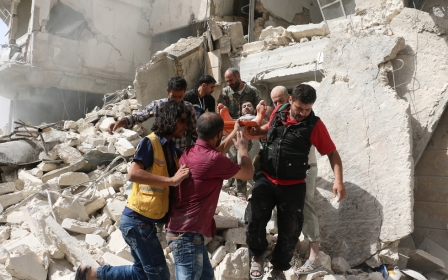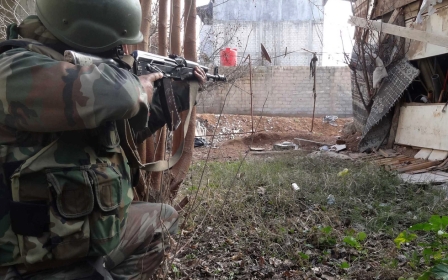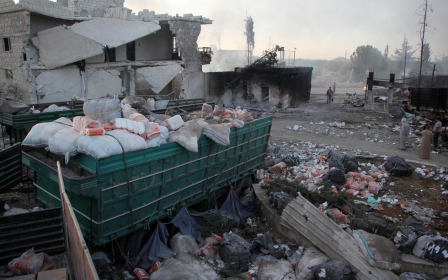Bashar al-Assad: If Aleppo were under siege, people would be dead
Bashar al-Assad has denied his forces are besieging the rebel-held areas of Aleppo, stating that "people would dead by now" and insisting they had "everything" they needed.
The president of Syria's comments came in an interview with the AP news agency, released after a night of intense bombardment that left a reported 45 people dead, and fires raging across rebel-held areas.
Assad, whose forces earlier this week resumed hostilities after the failure of a US-Russian agreed ceasefire, said: "If there really is a siege around Aleppo, people would have been dead by now.
"They (the rebels) have been shelling neighbouring areas and Syrian army for years, non stop shelling... how could they be starving while at the same time have armaments? How can we (the government) prevent the food and medical aid from reaching that area when we cannot stop the armaments reaching the area?"
He denied government forces had deliberately bombed hospitals in rebel-held areas, said the siege was a fiction and that only a minority were complaining. However, he accused the US, which said it accidentally bombed some of his troops over the weekend, of lying.
"No it was not an accident. If it had been one plane... but it was four airplanes that kept attacking the position of the Syrian troops for an hour or even more than an hour," Assad told the agency. "They (US planes) were not attacking a building in a (city) quarter but a huge place concentrated of many hills and there were no terrorist groups adjacent to the Syrian groups."
In response to questions about the suffering of the people of Aleppo, he said: "We cannot say 'the people of Aleppo' because the majority live under the control of the government.
"Some, allegedly claiming this (being besieged), I would tell them how could you still be alive?
"Why don't you have epidemics if you do not have doctors? How could you accuse Syria of attacking hospitals? So you have hospitals and you have doctors and you have everything! How could you have them?"
Assad's comments were released as the UN announced it would resume aid shipments in Syria, having cancelled them on Tuesday after a convoy was destroyed and 20 people killed while attempting to transport food to Aleppo city. The UN's humanitarian agency, the OCHA, said it was delivering aid to an area of rural Damascus.
US Secretary of State John Kerry and his Russian counterpart Foreign Minister Sergei Lavrov on Thursday convened a crisis meeting of governments with a stake in the Syrian civil war.
Ministers from the 23-nation International Syria Support Group gathered at a New York hotel for the second time in three days to seek a way to revive a plan to re-impose a ceasefire that collapsed this week.
The US has directly blamed Russia for the attack on the Aleppo convoy, which Moscow denies.
General Joe Dunford, the chairman of the Joint Chiefs of Staff, said on Thursday two Russian aircraft were in the area when the attack happened.
"There is no doubt in my mind that the Russians are responsible, I just don't know whose aircraft actually dropped the bomb," he told the Senate armed services committee.
Assad, meanwhile, blamed "terrorists" for the attack.
"Those convoys were in the area of the militants, the area under the control of the terrorists," he said.
"That's what they should accuse first: the people or the militants, the terrorists who are responsible for the security of this convoy.
"So, we don't have any idea about what happened. The only thing that we saw was a video of a burnt car, destroyed trucks, nothing else.
"We are, as a government, as officials, we are committed morally toward the Syrian people, morally, constitutionally, and legally, to help them in every aspect to have the basic needs for their livelihood."
This article is available in French on Middle East Eye French edition.
New MEE newsletter: Jerusalem Dispatch
Sign up to get the latest insights and analysis on Israel-Palestine, alongside Turkey Unpacked and other MEE newsletters
Middle East Eye delivers independent and unrivalled coverage and analysis of the Middle East, North Africa and beyond. To learn more about republishing this content and the associated fees, please fill out this form. More about MEE can be found here.




